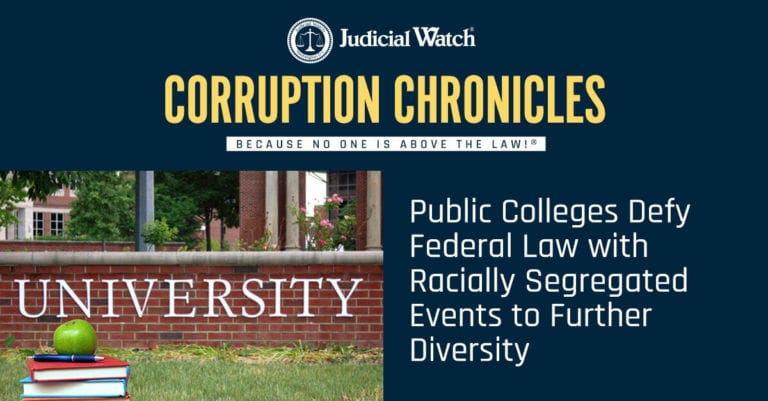

Public Colleges Defy Federal Law with Racially Segregated Events to Further Diversity


The Department of Justice (DOJ) should investigate “an alarming trend of racial segregation” at America’s taxpayer-funded universities, according to a pair of United States Senators who cite a number of troubling examples in a letter to Attorney General William Barr. The incidents appear to be part of a growing and increasingly powerful movement aimed at promoting diversity by somehow undoing what leftists assert is systemic racism at academic institutions in the U.S. This has led officials at campuses nationwide to organize numerous events, create race-based dorms and other divisive activities that, ironically, infringe upon the decades-old federal law enacted to prohibit it.
In fact, in the letter to Barr the senators—Tom Cotton of Arkansas and Kelly Loeffler of Georgia—note that the colleges appear to be violating Title VI of the Civil Rights Act of 1964, the landmark legislation that prohibits discrimination on the basis of race, color, religion, sex or national origin. The law also strengthened school desegregation and voting rights. The section that the lawmakers refer to in their letter to the attorney general specifically prohibits discrimination based on race in federally funded activities or programs like the ones listed. The senators urge the DOJ to investigate the discriminatory events and other accommodations provided in their letter as well as other similar cases as part of “our nation’s commitment to equality before the law.” After noting examples as well as a National Association of Scholars report documenting incidents, the legislators write this: “Sadly, there is evidence that segregation is a growing trend, especially on college campuses.”
Cotton and Loeffler point out two recent examples in the letter to Barr. The first involves online discussion groups hosted by the University of Michigan that were segregated based on race, with moderators also segregated by race. Situated in Ann Arbor, the school is ranked third nationally among all public universities and has an enrollment of around 31,500. The events, sponsored by the campus Center for Social Justice and Inclusion, were advertised as “virtual cafes” that offered opportunities for students to gather and discuss their experience on campus and in the world as members of a particular racial group. The series of discussions included separate events for Black, Indigenous and People of Color (known as BIPOC) and “non-POC”, or white students. “In plain English, the University of Michigan appears to have created ‘whites-only’ and ‘non-whites-only’ events, in a manner reminiscent of the doctrine of racial segregation overturned by Brown v. Board of Education,” the senators’ letter states. The lawmakers reveal that the university’s chancellor subsequently apologized, though the school maintains that the race-based events were never intended to be exclusive or exclusionary for individuals of a certain race.
Another example embedded in the letter involves the University of Kentucky, a public institution in Lexington with an enrollment of about 30,000. In August, a campus conglomerate called Bias Incident Support Services (BISS) hosted segregated training sessions for resident assistants (RA), students who oversee dorms and enforce policies and rules, typically in exchange for free housing and a meal plan. One of the sessions was for “RAs who identify as Black, Indigenous, Persons of Color, and one for RAs who identify as White.” The training that excluded white students was described as “Healing Space for Staff of Color” while the training for white students was coined “White Accountability Space.” In the “whites-only” meeting RAs received materials that listed “common racist behaviors and attitudes of white people.” Amusingly, segregation was one of the examples on the list. BISS is responsible for cultivating and nurturing a culture of belonging at the University of Kentucky, according to its website, which states that “inclusion is what diversity looks like in action.” BISS also claims that it engages in programming and activities centered in inclusive excellence.
The August event certainly did not reflect that. In fact, it was quite the opposite. “College administrators often rationalize these forms of racial segregation, claiming they give members of certain racial groups, especially minority groups, spaces where they can discuss shared concerns and issues,” the senators write. “Thus, these defenders attempt to portray racial segregation as a tool to further diversity.” Some in academia also claim that segregated facilities and events protect racial minorities from what they assert is endemic racism in schools, according to the lawmakers. “Whatever the rationale, the effect of racial segregation is to divide the student body on a college campus, creating racial or ethnic enclaves,” the letter declares. The senators end by pointing out that racial segregation is antithetical to our nation’s creed and that it is illegal under multiple federal laws.















